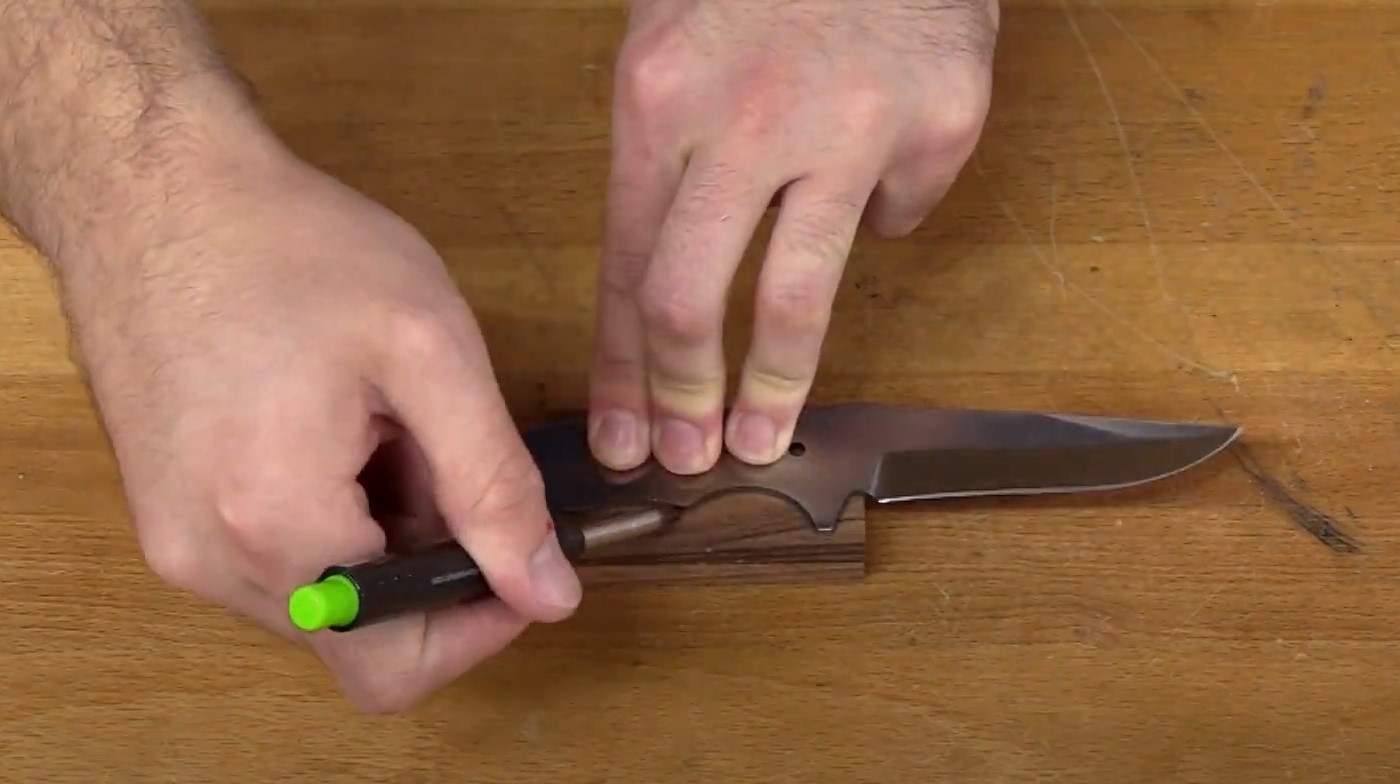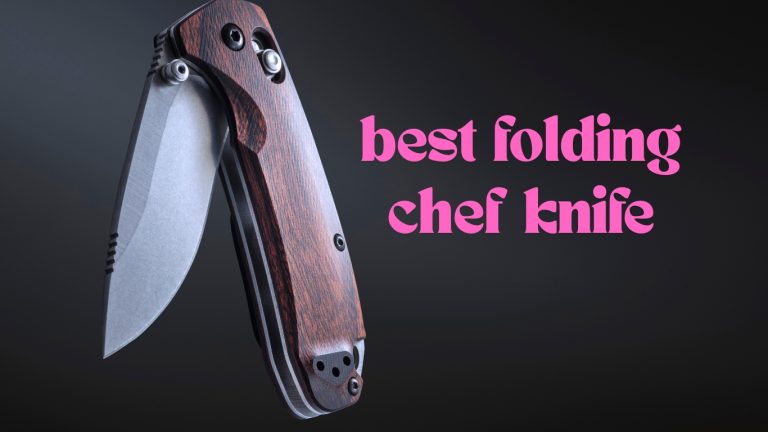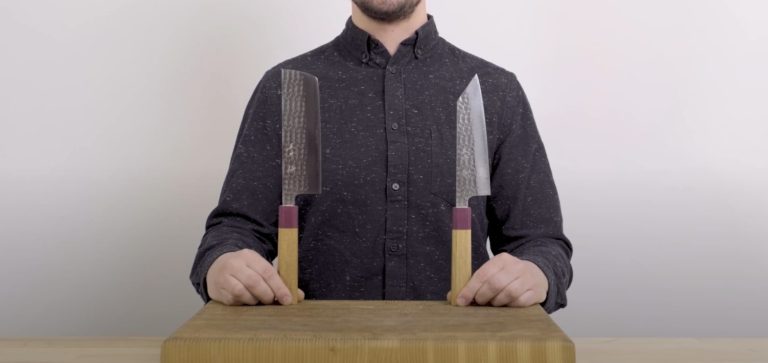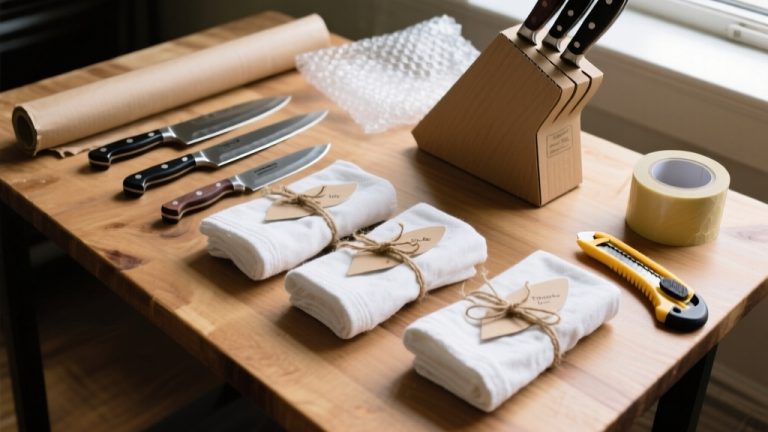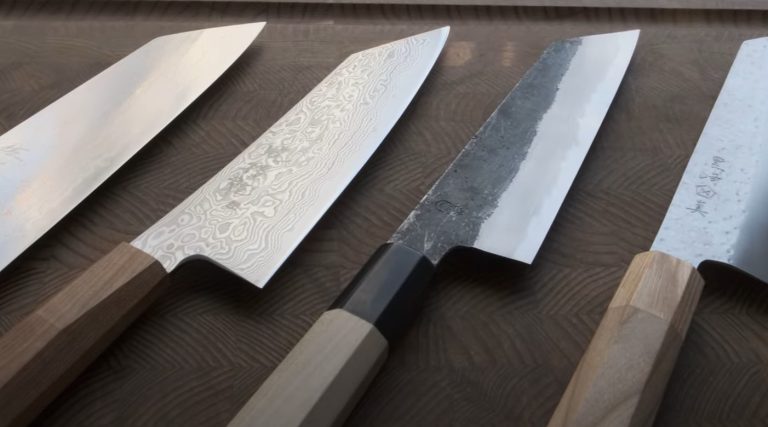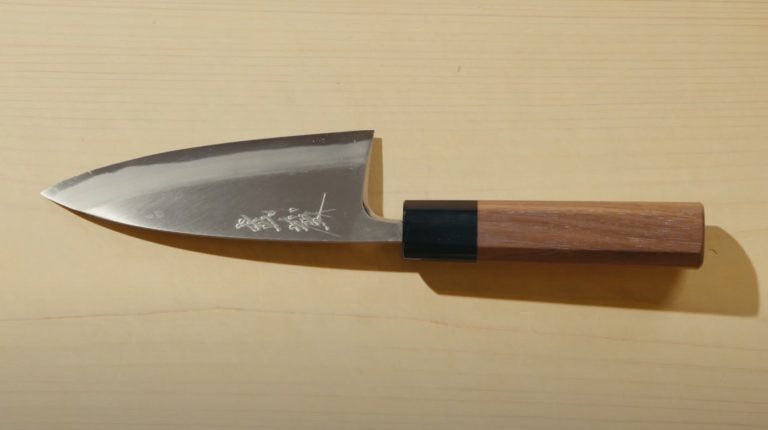Best Woods for Knife Handles, According to Expert Craftsmen
Looking for the best woods for knife handles? You’re in the right spot! Expert craftsmen rave about Riakrum Ironwood for its durability, Sasylvia Black Ebony for striking looks, and IECAP LLC Ironwood Scales for unique grains.
Don’t overlook Rhinoceros Sandalwood for vibrant color, or Honduras Rosewood for elegance. Macassar Ebony, Bookmatched Natural Wood, and other premium options also shine.
Stick around to uncover deeper insights into crafting the perfect knife handle.
| Image | Name | Editor's Rating | Price |
|---|---|---|---|

|
Riakrum 4 Pieces Ironwood Knife Handle M...
|
|
|

|
Sasylvia 4 Pcs Black Knife Handle Scales...
|
|
|

|
IECAP LLC Bookmatched Ironwood (Burl Bal...
|
|
|

|
IECAP LLC Bookmatched Natural Wood Knife...
|
|
|

|
Uotowell Blank Scales Wood Handle for Kn...
|
|
Key Takeaways
- Ironwood offers exceptional durability and unique grain patterns, ideal for long-lasting knife handles.
- Black Ebony provides a striking appearance with high resistance to breaking, perfect for premium designs.
- Rosewood, like Honduras Rosewood, delivers a rich color and elegant luster for aesthetic appeal.
- Rhinoceros Sandalwood combines dense durability with stunning red hues, enhancing visual uniqueness.
- Macassar Ebony features bold black stripes over golden tones, versatile for distinctive knife handles.
Riakrum Ironwood Knife Handle Material (4 Pieces)
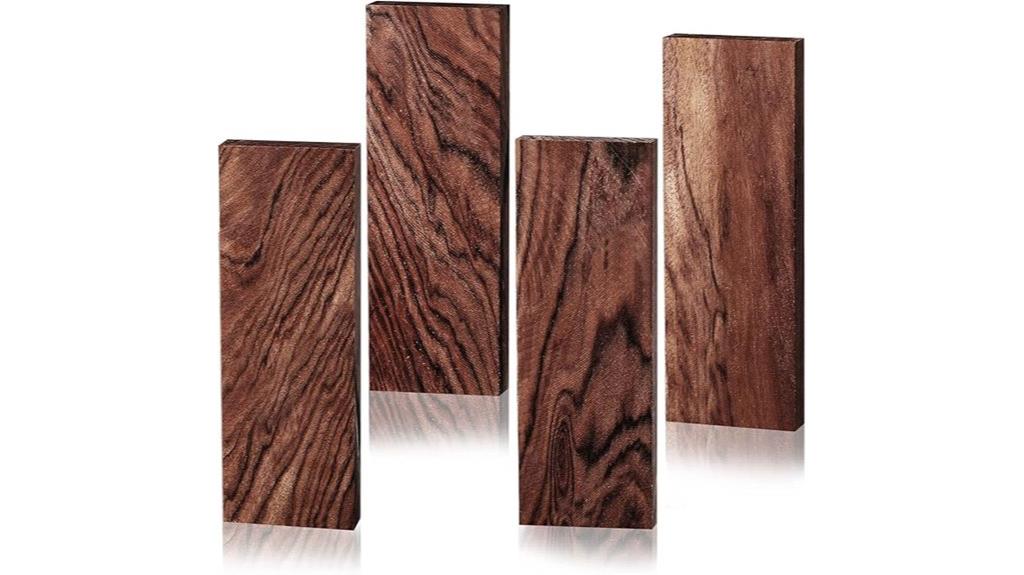
If you’re a DIY enthusiast or a professional knife maker searching for durable and versatile handle material, the Riakrum Ironwood Knife Handle Material (4 Pieces) could be your ideal pick.
Each set includes four wood scales, sized at 5.12 x 1.77 x 0.51 inches, perfect for knife making or other crafts like carving and pens.
You’ll appreciate ironwood’s renowned strength and unique grain patterns, though some pieces might differ in appearance.
Best For: DIY enthusiasts and professional knife makers looking for durable and versatile wood scales for crafting projects.
Pros:
- High durability due to ironwood’s renowned strength, ensuring long-lasting use.
- Versatile applications for knife making, carving, pens, and other creative crafts.
Cons:
- Grain patterns may vary between pieces, potentially affecting aesthetic consistency.
Sasylvia Black Ebony Lumber for DIY Crafts (4 Pcs)
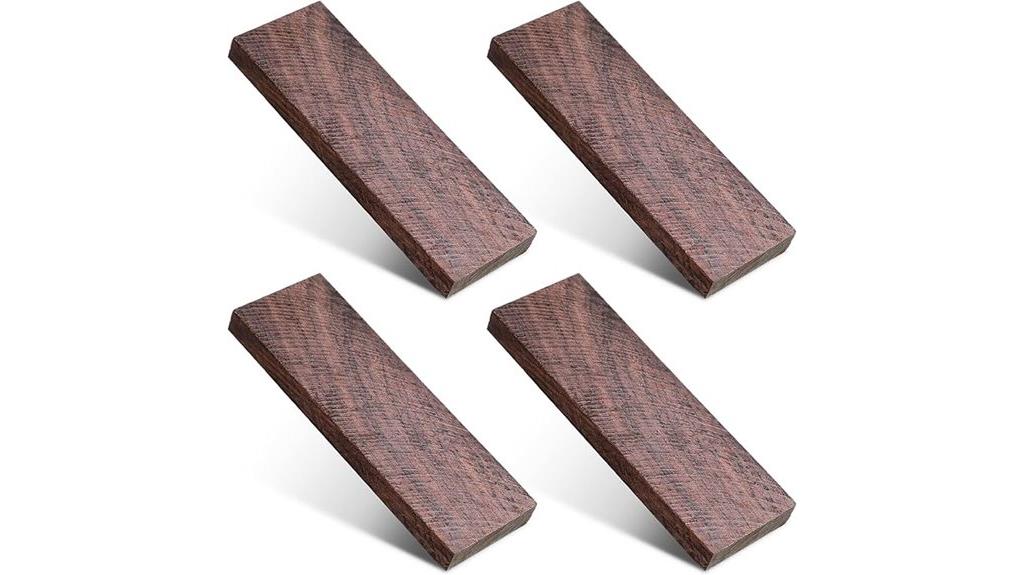
Immerse yourself in the world of crafting with Sasylvia Black Ebony Lumber, a top pick for enthusiasts and professionals seeking the best woods for knife handles.
These 4 pieces, sized at 4.7 x 1.6 x 0.4 inches, offer solid, durable black ebony that resists breaking and aging. You’ll find them perfect for knife handles, pens, or musical instrument accessories.
Dive into DIY with ease, as this wood suits both amateurs and pros.
Best For: Craft enthusiasts and professionals looking for high-quality black ebony wood for knife handles and other DIY projects.
Pros:
- Made from solid black ebony, ensuring durability and resistance to breaking or aging.
- Versatile for various applications, including knife handles, pens, and musical instrument accessories.
Cons:
- Limited to smaller projects due to the specific dimensions of the wood pieces.
IECAP LLC Bookmatched Ironwood Knife Handle Scales
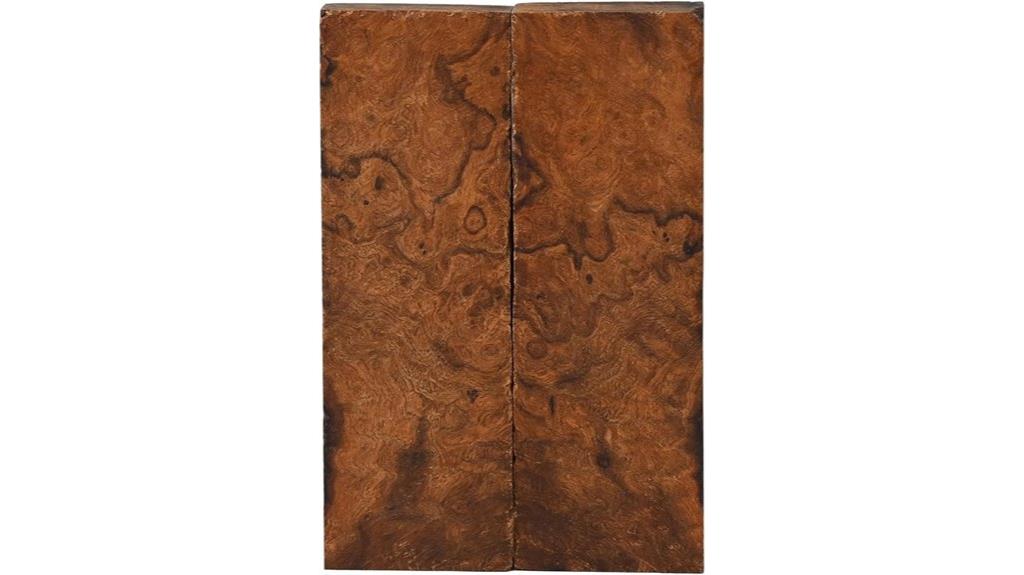
Discover the unique appeal of IECAP LLC Bookmatched Ironwood Knife Handle Scales, a top pick for artisans and hobbyists craving exotic materials for their custom creations.
You’ll love the premium ironwood, sized at 5 1/8 x 1 3/4 x 1/2 inches, perfect for knife handles or small projects. Each set of two pieces boasts unique color and grain variations, ensuring one-of-a-kind results.
Best For: Artisans and hobbyists seeking premium exotic ironwood for custom knife handles or small ornamental projects.
Pros:
- Unique color and grain variations ensure one-of-a-kind results for each set.
- Premium ironwood material ideal for knife handles and small creative projects.
Cons:
- Rough edges and cuts may require additional sanding and finishing work.
IECAP LLC Bookmatched Natural Wood Knife Scales (Ironwood)
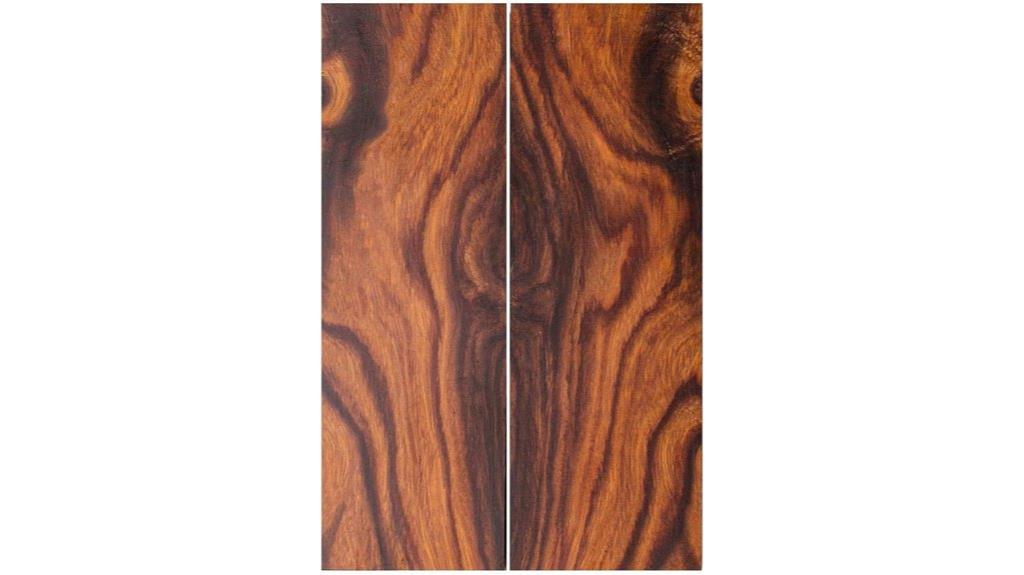
Crafters and knife enthusiasts, take note of the IECAP LLC Bookmatched Natural Wood Knife Scales in Ironwood, a top pick for creating standout knife handles.
You’ll appreciate the premium exotic wood, sized at 3/8 x 1 9/16 x 4 3/4 inches, perfect for both pros and beginners. Its stability and strength resist warping, while unique color and grain variations guarantee one-of-a-kind results.
However, watch out for mixed reviews on quality and dimensions.
Best For: Crafters and knife enthusiasts looking for premium, exotic wood to create unique and durable knife handles.
Pros:
- Premium ironwood material offers exceptional stability and strength, resisting warping and damage.
- Unique natural color and grain variations ensure each set of scales is one-of-a-kind.
Cons:
- Potential odor issues during crafting have been noted.
Blank Scales Wood Handle for Knife (Rhinoceros Sandalwood)
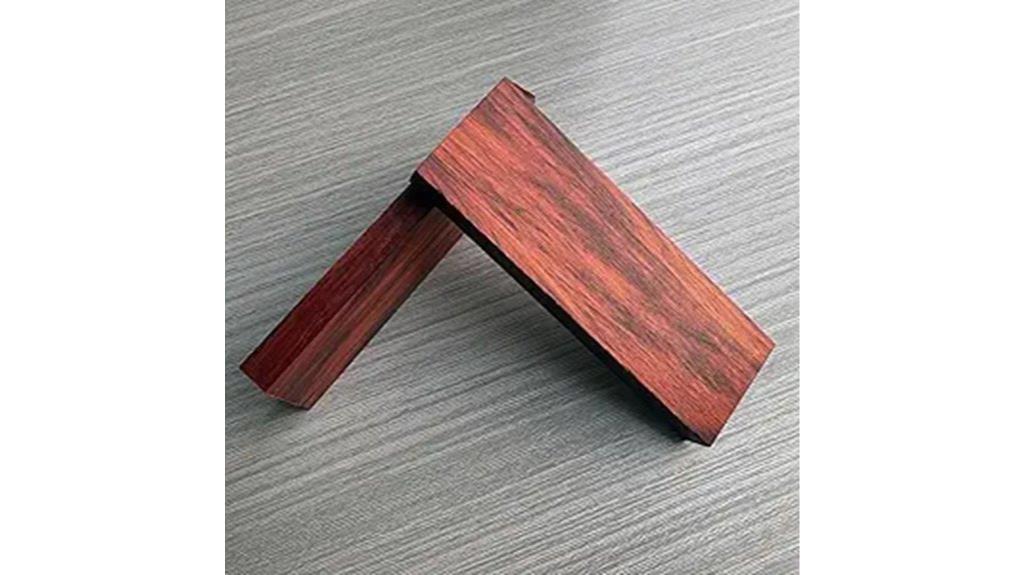
Dive, knife-making enthusiasts, if you’re hunting for a standout material for your next project, the Blank Scales Wood Handle in Rhinoceros Sandalwood is a top pick. This pre-cut sandalwood, sized at 4.75 x 1.58 x 0.4 inches, boasts a dense, durable build that resists cracking and moisture.
You’ll love its unique grain patterns and stunning Rhinoceros Red color, perfect for luxury knife handles or custom grips.
With a high rating from users, it’s praised for beauty and quality. Pre-processed for precision, it saves you time and effort, ensuring a flawless finish straight from the package.
Best For: Craft enthusiasts and knife makers seeking a high-quality, pre-cut sandalwood material for luxury knife handles and custom grips.
Pros:
- Offers a dense, durable build that resists cracking and moisture, ideal for long-lasting projects.
- Features unique grain patterns and a stunning Rhinoceros Red color for a premium aesthetic.
- Pre-processed dimensions save time and ensure precision in crafting, with a beautiful finish straight from the package.
Cons:
- Occasional defects in the wood have been noted, potentially requiring additional sanding or rework.
- Limited size options may not suit larger or custom projects beyond the specified dimensions.
1PC Blank DIY Octagonal Wooden Handle for Japanese Kitchen Knives
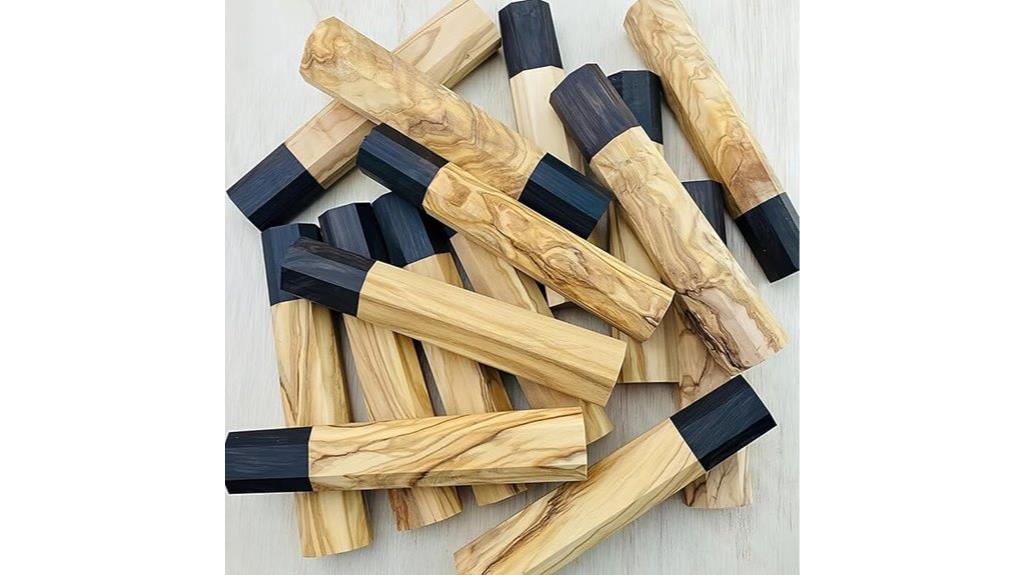
If you’re a DIY enthusiast looking to customize your Japanese kitchen knives, the 1PC Blank DIY Octagonal Wooden Handle by TEAMWILL is an excellent choice.
Crafted from olive wood or black sandalwood, this 60g unfinished handle offers a unique octagonal shape for a comfortable grip. You’ll need to sand and polish it yourself using sandpaper and a bristle wheel to achieve a smooth finish.
Note that the pre-drilled hole might be off-center, so check alignment with a coffee straw before drilling through. Add personal flair with stains or copper accents for a standout look!
Best For: DIY enthusiasts and knife makers looking to customize Japanese kitchen knives with a unique, hand-finished wooden handle.
Pros:
- Offers a unique octagonal shape for a comfortable and secure grip.
- Made from high-quality materials like olive wood and black sandalwood.
- Allows for personalization through sanding, polishing, and custom accents.
Cons:
- Comes unfinished, requiring additional effort for sanding and polishing.
- Pre-drilled hole may be off-center, necessitating careful alignment checks.
IECAP LLC Ironwood Knife Scales for DIY Crafts
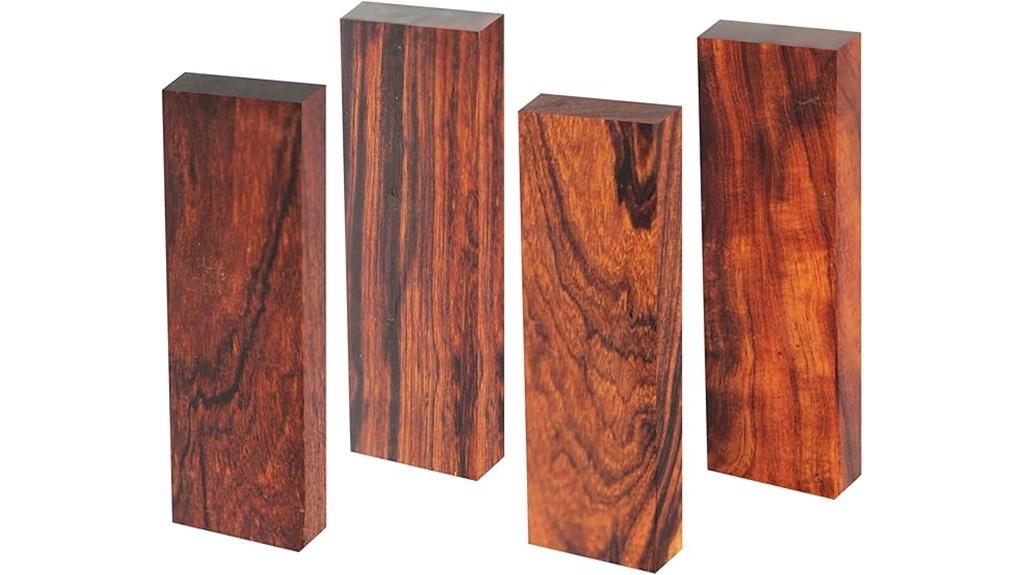
Looking for a standout material for your next knife-making project? Check out IECAP LLC Ironwood Knife Scales for DIY Crafts.
You’ll get four premium scales, each 5.12 x 1.77 x 0.51 inches, sourced from a top Mexican burl wood plant. Their unique grain patterns and rich colors guarantee your knife handle stands out, while the natural texture offers a non-slip grip.
These ironwood scales boast exceptional hardness for durability and are easy to shape for a polished finish.
Best For: Craft enthusiasts and knife makers seeking premium, durable ironwood scales for unique, custom knife handles.
Pros:
- Exceptional hardness ensures long-lasting durability for knife handles.
- Unique grain patterns and rich colors create visually striking, one-of-a-kind designs.
- Natural texture provides a secure, non-slip grip for safety and comfort.
Cons:
- Inconsistent grain patterns can lead to variations in appearance.
- May require additional care during shaping to avoid potential flaws.
Macassa Black Ebony Lumber for Knife Handle Scales (2 Pieces)
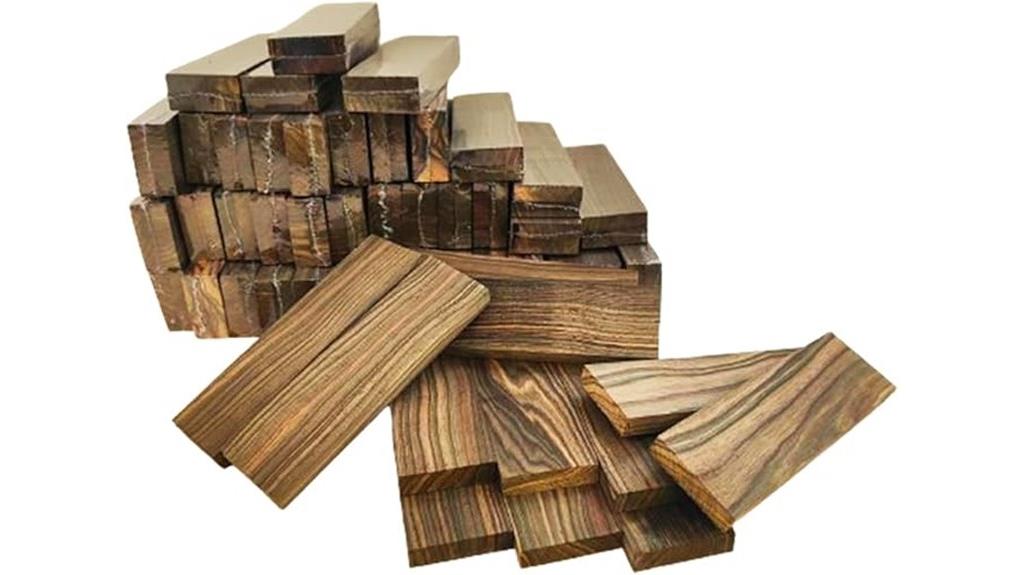
Crafters and knife enthusiasts, you’ll find Macassa Black Ebony Lumber for Knife Handle Scales to be a top pick for creating standout pieces. This exotic Macassar Ebony, also called Golden Ebony, boasts striking black stripes over golden tones.
Each pair, cut from a single block, measures 3/8 x 1 1/2 x 5 1/8 inches and offers unique grain patterns with natural imperfections that add character.
You’ll love its versatility for knife handles, pens, or jewelry boxes. Though dense, requiring sharp tools, its smooth surface makes crafting a breeze for both pros and beginners.
Best For: Crafters and knife-making enthusiasts looking for exotic, high-quality wood to create unique and standout knife handles or other small woodworking projects.
Pros:
- Offers striking visual appeal with black stripes over golden tones, ensuring each piece is unique.
- Versatile for various projects like knife handles, pens, and jewelry boxes, suitable for both professionals and beginners.
- Features a smooth surface that makes crafting easier despite its density.
Cons:
- Dense material requires sharp tools, which may pose a challenge for those without proper equipment.
- Natural imperfections, while adding character, may not suit projects requiring a flawless finish.
Exotic Wood Zone Honduras Rosewood Knife Handle Blanks
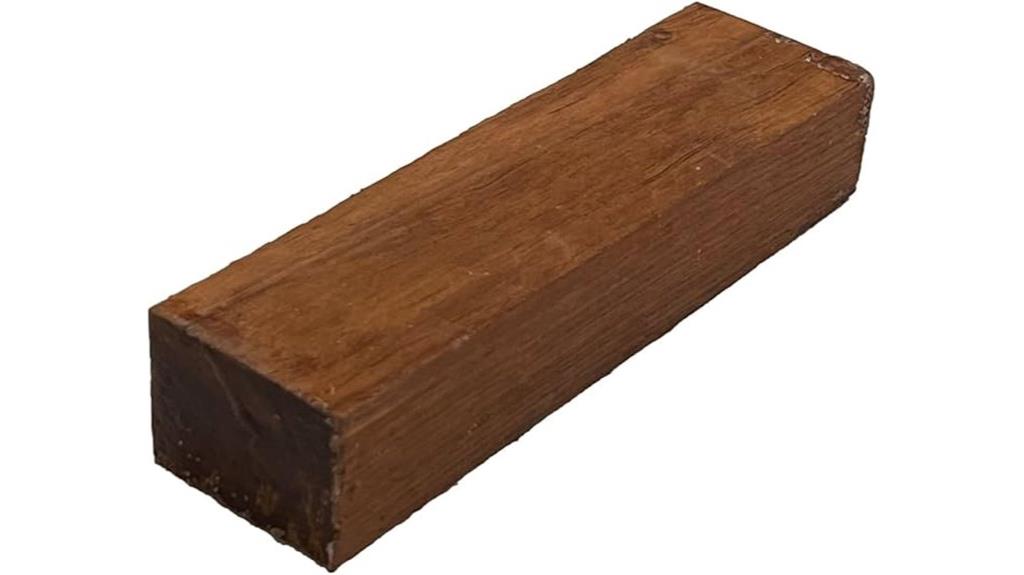
Discover the Exotic Wood Zone Honduras Rosewood Knife Handle Blanks, a top pick for artisans craving durability and elegance in their custom creations.
You’ll love the rich, rosewood color and the sturdy feel of these 1 x 1-1/2 x 5-inch blanks, weighing 1.5 pounds. Perfect for crafting custom knife handles, they’re ideal for full tang designs and suit both left and right-handed users.
Remember to hand wash them for care. Shop now and release your imagination with Honduras Rosewood’s unmatched beauty and strength!
Best For: Artisans and knife makers seeking premium, durable, and elegant materials for crafting custom knife handles.
Pros:
- Offers a rich, rosewood color that enhances the aesthetic appeal of custom knife handles.
- Sturdy and reusable, ideal for full tang designs and suitable for both left and right-handed users.
Cons:
- Limited moisture content of 15% may require additional drying or acclimation before use.
Knife Handle Woods: What to Know Before You Choose?
When picking wood for your knife handles, you’ve gotta think about durability to guarantee it lasts through tough use.
Consider the grain pattern’s uniqueness for a standout look, alongside resistance to moisture to prevent damage over time. Don’t forget ease of shaping and the wood’s weight to maintain balance in your hand.
Wood Durability Matters
As you select wood for knife handles, remember that durability plays a critical role in ensuring both longevity and functionality. Opt for hardwoods like ironwood and ebony, which resist wear and damage remarkably well.
These dense materials, including Honduran rosewood and Macassar ebony, offer strength and stability, so your handle won’t crack or bend under pressure.
Consider ironwood for its unmatched hardness, ensuring the handle keeps its shape during heavy use. Also, pick woods with natural resistance to moisture and temperature changes to prevent warping or splitting over time.
Don’t overlook anti-aging properties in woods like black ebony—they’ll keep your knife handle reliable and visually appealing for years. Choose wisely for lasting performance!
Grain Pattern Uniqueness
Beyond durability, you’ll want to look at the grain pattern uniqueness when picking wood for knife handles. These natural variations aren’t just about looks; they make each handle visually distinct and personal.
Unique grains, like the striking patterns in ironwood or the darker, uniform lines in ebony, can elevate a knife’s aesthetic appeal and value, especially for handcrafted pieces sought by collectors.
Moreover, grain patterns impact more than appearance. They can hint at the wood’s strength, with some indicating denser, more resilient material. Irregularities might also affect texture, influencing your grip and comfort during use.
Resistance to Moisture
While aesthetics matter, you shouldn’t ignore a wood’s resistance to moisture when selecting a material for knife handles. Moisture can cause warping or cracking, so you’ve gotta pick woods like ironwood or ebony, known for their superior resistance.
High-density options, such as rosewood, contain natural oils that boost their ability to repel water, making them perfect for wet conditions.
Don’t forget that a proper finish and seal can greatly enhance any wood’s moisture resistance, protecting your handle’s integrity during use or storage. Opt for woods with tight grain structures to minimize water absorption, ensuring durability.
Also, consider ebony for its anti-aging properties, as it’ll maintain performance even in humid environments, keeping your knife reliable for years.
Ease of Shaping
Take a close look at the ease of shaping when picking wood for knife handles, as it can make or break your crafting experience.
Hardness and density matter—harder woods like ironwood or ebony demand sharper tools and more effort, sometimes even specialized equipment. You’ll also notice that unique grain patterns can complicate carving, requiring extra sanding for a smooth finish.
Consider the wood’s moisture content too; lower levels make shaping easier, but if it’s too dry, you risk cracking. To save time, opt for pre-cut wood scales with standardized dimensions and ready-to-finish surfaces.
Weight and Balance
Precision matters when selecting wood for knife handles, especially regarding weight and balance. You’ve gotta consider how the wood’s weight impacts the knife’s overall feel. Heavier woods offer a stable grip, while lighter ones boost maneuverability.
Aim for woods with a density of 0.5 to 0.9 grams per cubic centimeter to strike the right balance between weight and durability.
A well-balanced handle reduces fatigue during long use, so make certain the wood’s weight complements the blade’s. You’ll want consistent density across the handle scales to guarantee a harmonious design.
Aesthetic Appeal Factors
Beauty plays a key role when choosing wood for knife handles, as the right aesthetic can elevate your knife’s overall appeal. You’ll notice how unique grain patterns and colors, like those in ironwood and ebony, create striking visual effects that make your knife stand out.
Woods such as rosewood offer a rich, warm hue with a mesmerizing luster that enhances the handle’s look.
Beyond color, consider the wood’s finish and cut. A well-finished surface and thoughtful thickness boost the perceived quality of your knife. Natural imperfections or varying grains add uniqueness to each piece, ensuring no two handles are identical.
Hardness for Longevity
Durability stands as an essential factor when selecting wood for knife handles, and hardness directly impacts how long your handle will last. Opt for woods ranking high on the Janka hardness scale, which measures resistance to wear and denting.
Hardwoods like Ironwood and Ebony excel here, ensuring your handle withstands daily use without significant damage.
You’ll also appreciate that harder woods resist moisture and temperature changes better, extending the life of your knife handle. Choosing a high-density hardwood reduces the risk of cracks and splits, maintaining the handle’s integrity over time.
Grip Comfort Level
While hardness guarantees your knife handle lasts, the way it feels in your hand matters just as much for everyday use.
You’ll want to take into account the wood’s texture and grain pattern since smoother surfaces boost comfort during long tasks. Opt for species like Ironwood or Ebony for their durability and secure grip, enhancing safety.
Also, think about the wood’s weight. Heavier options give a substantial feel, while lighter ones improve maneuverability—pick what suits you. Woods with natural oils offer a non-slip grip for better control.
Frequently Asked Questions
How Durable Are Wooden Knife Handles?
Hey, did you know that over 80% of chefs prefer wooden knife handles for their durability? When you’re wondering how durable these handles really are, you’ve gotta consider the wood type and care.
Don’t let moisture sit on them; wipe ’em down after use. With proper maintenance, they’ll resist cracking and last years.
Keep ’em oiled, and you’ll feel the strength in every slice. Trust me, you’ll notice the difference!
Can Wooden Handles Be Customized Easily?
Hey, you’re probably wondering if wooden handles can be customized easily. Well, you’re in luck! You can definitely shape, carve, and engrave these handles to match your style.
With the right tools, you’ll find it’s a breeze to add personal touches like patterns or initials. Just make sure you’ve got a steady hand and some patience, and you’ll transform that handle into something uniquely yours in no time!
Are Wooden Handles Slip-Resistant When Wet?
Hey, you might wonder if wooden handles are slip-resistant when wet. Well, you’ve gotta be cautious since most wood can get slick under moisture, increasing the risk of accidents.
However, you can improve grip by choosing woods with natural texture or applying finishes like linseed oil. Don’t forget to maintain them regularly, ensuring they’re sealed properly. Keep safety first, and you’ll handle those wet conditions just fine!
How to Maintain Wooden Knife Handles?
Isn’t it ironic how you cherish your wooden knife handles, yet neglect their care, expecting them to last forever? Don’t worry, maintaining them isn’t rocket science!
Wipe ’em down after use to avoid moisture buildup. Rub in some mineral oil monthly to keep ’em hydrated and prevent cracking.
Avoid soaking ’em in water or tossing ’em in the dishwasher. Treat ’em right, and they’ll stick with you through thick and thin!
Do Wooden Handles Affect Knife Balance?
Hey, have you ever wondered if wooden handles mess with a knife’s balance? You’re right to ask! Wooden handles can indeed shift the weight distribution, depending on their density and size.
Don’t ignore this—test the knife in your hand to feel its balance. If it’s off, you’ll notice uneven control. Pick a handle that complements the blade’s weight, ensuring you’ve got precision and comfort while cutting.
Your Perfect Handle Starts Now
Hey, you’ve got the scoop on the best woods for knife handles now! Pick your fave, like ironwood or black ebony, and craft a blade that’s totally rad.
Keep factors like durability and grip in mind, and you’ll be slicing like a medieval knight with a trusty broadsword.
Don’t wait, grab those scales or blanks and get started on a handle that’s uniquely yours. Your knife-making quest awaits, champ.

